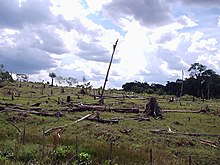Telecoupling
The concept of telecoupling is a logical extension of research on coupled human and natural systems, in which interactions occur within particular geographic locations.
[2] The integration of these dynamic fields of science is what allows the telecoupling framework to comprehensively analyze distal connections that have been previously understudied and unacknowledged.
System interactions are recognized as "flows" within the telecoupling framework, and bring attention to "spillover sites"[1] or "leakages.
In Tromboni et al. 2021 the metacoupling framework is applied to the field of macrosystems biology in an effort to find reconciliation for ecological issues at the global scale.
Power dynamics between governances are more clearly revealed when analyzing coupled human and natural system flows, especially when compensation is not given to spillover sites despite complaint.
[3] The atmospheric system, as a result of greenhouse gas accumulation, is a spillover site that lacks a governance, and has therefore been unrepresented.
The unacknowledged, destructive effects of greenhouse gas emissions on the atmosphere has been integral to current climate change.
[3] Current ideological shifts towards sustainable practices are likely motivated by the internet induced ability to recognize distal connectivities, and feel "empathy at a distance"[3] for spillover sites.
Prior to these patterns of human connection, countries would have been more localized in their resource efforts and relied mainly on self-supporting goods and services.
A high demand for meat from an expanding population requires farmers in Brazil to cut down trees and plant crops to feed their animals.
"[10] The European Union enacted policy aimed at reducing fuel emissions in response to increasing climate change.
[1] Red imported fire ants or RIFA are native to South America and are considered an invasive species.
[1] The effects of this invasion affected the economic sector of the United States very harshly causing $6 million in damages, primarily in the agriculture and trade fields.
Kirtland's warbler is a species of migratory bird that leaves their breeding ground in the Michigan area for The Bahamas in the colder months.
In response, both Michigan and the Bahamas attempted to protect the species, but created spillover effects in tourism, timber companies, and landowners of both locations.
While Brazil's economy is bolstered by this exportation, the Amazonian rainforest is depleted as it is deforested to expand agricultural lands.
On a global scale, deforestation contributes to climate change-the spillover site for soybean exportation is then the entirety of the globe.
However, the Cerrado savanna, which is an extension of the Amazon, was not protected by the moratorium, which led to a shift in location for deforestation practices, but not a curtailment of them.
[13] Their analysis predicts that a new soybean frontier will be established in South Africa, resulting in a mass loss of grazing lands for cattle.
Upon examination of the Belt and Road Initiative's (BRI) potential social, and ecological impacts, Yang et al. 2017 identify a plethora of challenge that may ensue, and require addressing, resulting from the telecoupled nature of the project.
Yang et al. specifically cites China's water distribution, as well as their reliance on coal and oil received from Middle Eastern countries.
[7][15][14] The relationship between these nations may prove to be unstable due to this dependence, and negatively affect the participation in the BRI, as well as its economic standing.
While the economic variable of trade are evident (supply, demand, price), those that involve society and the environment cannot be overlooked.
Moreover, comprehension of how these relationships change across various scales can be helpful in supporting the telecoupling framework and holistically analyzing broader themes of socioeconomic and environmental discourse.





